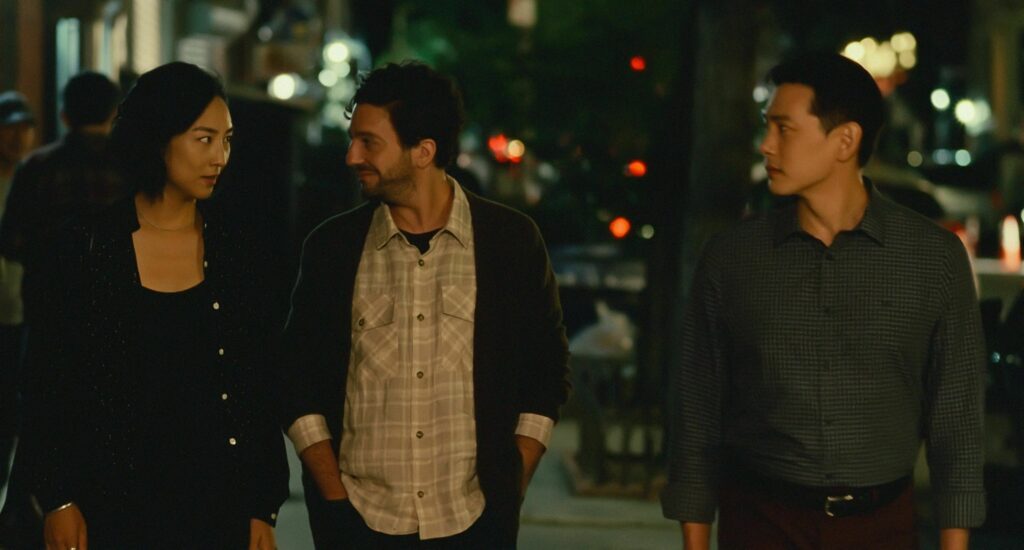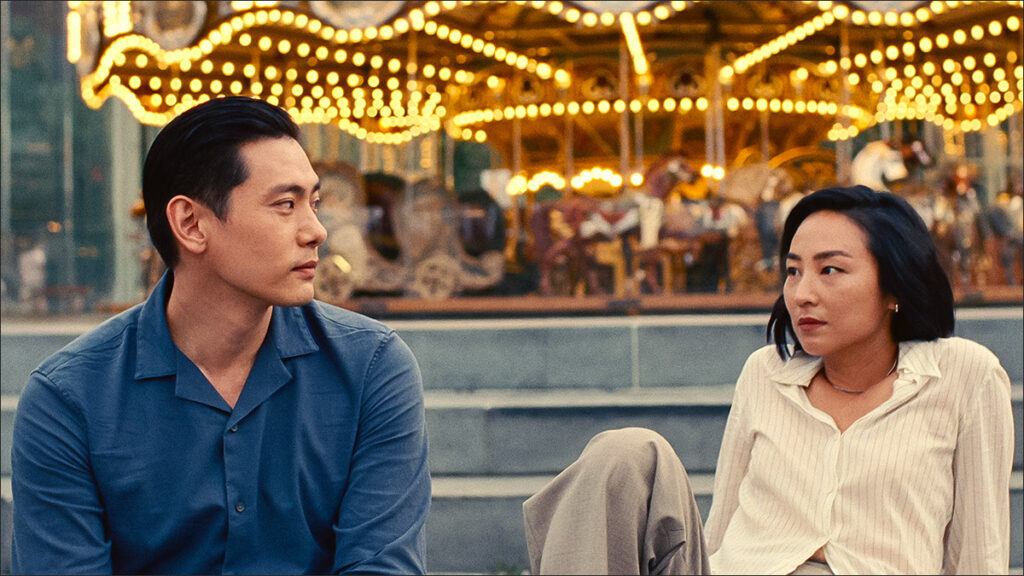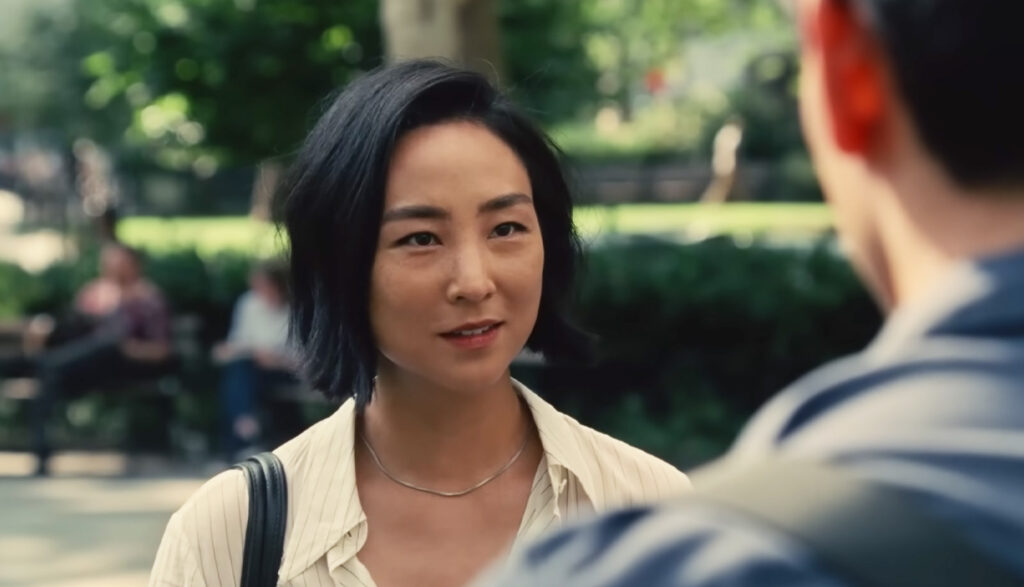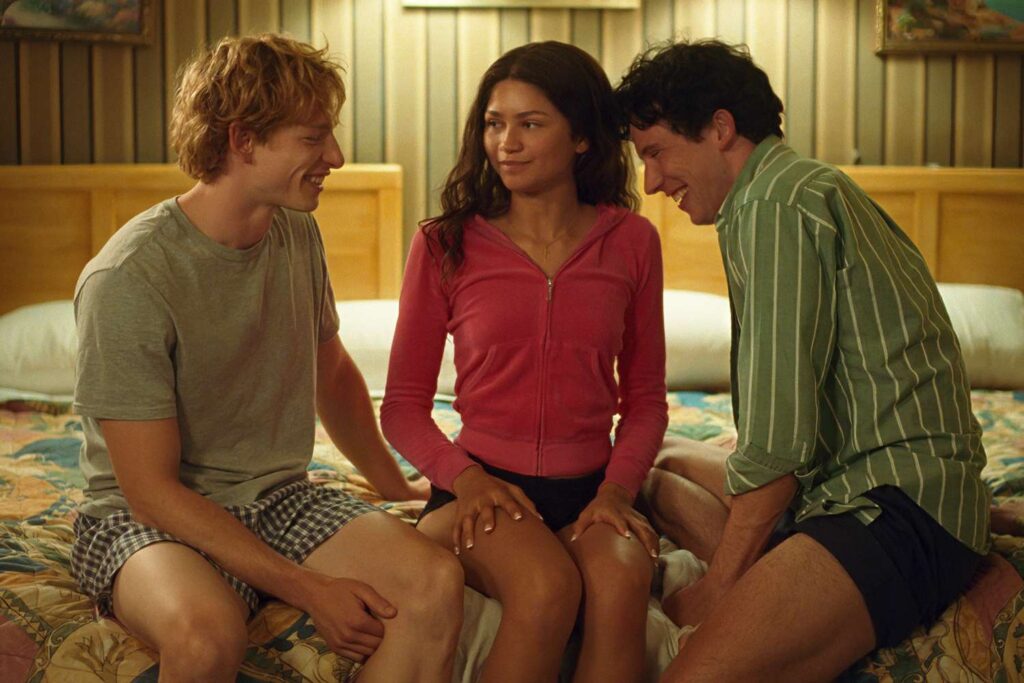
Challengers is an absorbing and entertaining set of character studies, wrapped in a love triangle and set in the world of tennis. Anything but a conventional sports movie, Challengers is remarkably insightful about what it takes to be successful in any competitive endeavor. Director Luca Guadagnino tells his story of three people over 13 years, flashing back and forth between their encounters in the present and roughly 8, 11, 12 and 13 years before.
When we first meet Tashi (Zendaya), she is a juniors champion about to dominate collegiate tennis and already a celebrity; she is clearly headed for Tiger Woods/Michael Jordan territory, where she will be the headliner whenever she competes and her endorsement revenue will dwarf her winnings. Tashi is highly intelligent, beautiful, driven and confident, and, as a teen, is already an astute and clear eyed observer of human character.
Patrick (Josh O’Connor) and Art (Bill Faist) are, as most teen boys, much simpler. They are classmates and besties. Their tennis is not in Tashi’s stratosphere, but they are good enough to contend for the U.S. juniors doubles championship, and to realistically aspire to pro careers.
As tennis players, Patrick and Art are very equally matched. But, then there is the matter of testosterone – too much (Patrick) and perhaps not enough (Art).
Patrick has swagger – sometimes that of a charming rogue and sometimes that of a boor or bully. There’s a saying in sports that is usually applied to baseball pitchers and football quarterbacks – “He has a million dollar arm and a ten cent head“. That describes Patrick, who is too undisciplined to keep his temper in check and who has too much misplaced pride to accept coaching.
Art, on the other hand, is so fundamentally decent that we wonder where his ambition comes from. (Hint: it’s not from within Art himself.)
That’s what we come to learn about the three characters. One of the keys to Challengers is when each character figures out the other two. Tashi takes the measure of Patrick and Art with breathtaking rapidity. Patrick and Art come to understand the others, but much later and at different times. When the last light switch is toggled on, there’s an explosion.
Guadagnino’s previous three films (I Am Love, A Bigger Splash, Call Me by My Name) form what we calls his Desire Trilogy, and all three abound in sensual desire. Challengers could have been titled Desire, in the sense that competitive success pivots on who has the most desire, who wants it more than their peers, who has enough drive to fuel the grueling training and who has the killer instinct in competition.
Guadagnino is known for sensual films, set in beautiful places (a palazzo-like house in Milan, a glorious Mediterranean island and the Northern Italian countryside) and with abundant, tantalizing gourmet food. In contrast, Challengers takes place in hotel and motel rooms, tennis courts and locker rooms and the moment closest to food porn involves churros in a Stanford campus cafe. Guadagnino focuses the sensuality on the tennis scenes and the closeups of his actors as they hunger for victory or for sex.
There’s a constant undercurrent of lust, but calling Challengers primarily a love triangle would be too pat. It’s just such a rich depiction of the strengths and weaknesses of the characters, their respective vulnerability to manipulation and their relative levels of ambition.
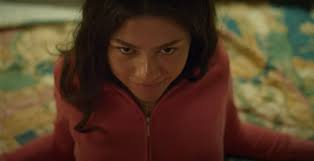
One key to the story in Challengers is when the characters figure each other out. One takes the measure of the other two immediately; each of the other two finally get the others, but at different times.
Challengers is superbly acted. Zendaya’s performance is a revelation, both in the way she hides Tashi’s thoughts from the guys and in her remarkable physicality. Guadagnino uses closeups and quick cutting to make Faist and O-Connor look like they’re playing high level tennis. Zendaya, ripping the ball in long shots, looks like she is ready for the U.S. Open.
Josh O’Connor – the feckless marriage-age Prince Charles in The Crown and the surly protagonist of La Chimera (by another Italian filmmaker, Alice Rohrwacher) – finally gets to play a character with joie de vivre, and he’s excellent.
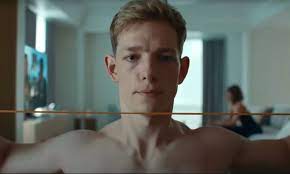
I hadn’t seen Bill Faist (West Side Story) before, and his performance in Challengers is often the most interesting. Affable, malleable and conflict-avoidant, the young Art knows when unrequited love is causing his unhappiness. But then, he’s also unhappy when he seems to have it all, and he doesn’t understand why.
Challengers is a wonderful two-hours-and-eleven minutes movie, but I think that there’s an even better one-hour-and-fifty-five minute movie inside; Guadagnino invests too much time in the final confrontation, drawing it out with plenty of slow-motion and house music. Still, this is one of the best films of 2024.

